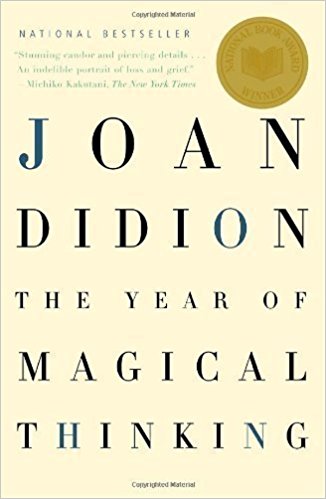Book Club Discussion Questions
In a book club? Subscribe to our Book Club Newsletter!
For supplemental discussion material see our Beyond the Book article, and our BookBrowse Review of The Year of Magical Thinking.
Please be aware that this discussion guide will contain spoilers!
The questions and
discussion topics that follow are designed to enhance your group’s discussion of
Joan Didion’s powerful, National Book Award–winning memoir,
The Year of
Magical Thinking. A spare, lucid, and remarkably moving examination of the
year following her husband’s sudden death just before their fortieth
anniversary, it is the story of Didion’s search for answers, for relief, and
above all for the chance to change the course of events. Filled with often
surprising insights and more than a dash of humor, it is one of the most
critically acclaimed books of the decade.
- Consider the four
sentences in italics that begin chapter one. What did you think when you read
them for the first time? What do you think now?
- In particular, address “The
question of self-pity.” Does Didion pity herself? In what ways does she indulge
that impulse, and in what ways does she deny it?
- Read the Judges’ Citation for the National Book Award, above. Why do you
suppose they deemed the book a masterpiece of investigative journalism?
- Discuss the notion of “magical thinking.” Have you ever experienced
anything like this, after a loss or some other life-changing occurrence? How did
it help, or hinder, your healing?
- Do you think Didion’s “year of magical thinking” ended after one year, or
did it likely continue?
- Consider the tone Didion uses throughout the book, one of relatively cool
detachment. Clearly she is in mourning, and yet her anguish is quite muted. How
did this detached tone affect your reading experience?
- How does Didion use humor? To express her grief, to deflect it, or for
another purpose entirely?
- Over the course of the book, Didion excerpts a variety of poems. Which
resonated for you most deeply, and why?
- To Didion, there is a clear distinction between grief and mourning. What
differences do you see between the two?
- One word critics have used again and again in describing this book is
“exhilarating.” Did you find it to be so? Why, or why not?
- Discuss Didion’s repetition of sentences like “For once in your life just
let it go”; “We call it the widowmaker”; “I tell you that I shall not live two
days”; and “Life changes in the instant.” What purpose does the repetition
serve? How did your understanding of her grief change each time you reread one
of these sentences?
- The lifestyle described in this book is quite different from the way most
people live, with glamorous friends, expensive homes, and trips to Hawaii,
Paris, South America, etc., and yet none of that spared Didion from experiencing
profound grief. Did her seemingly privileged life color your feelings about the
book at all? Did that change after reading it?
- At several points in the book Didion describes her need for knowledge,
whether it’s from reading medical journals or grilling the doctors at her
daughter’s bedside. How do you think this helped her to cope?
- Reread the “gilded-boy story” on pages 105–6. How would you answer the
questions it raised for Didion?
- Is there a turning point in this book? If so, where would you place it
and why?
- The last sentence of the book is “No eye is on the sparrow but he did
tell me that.” What does this mean?
- Didion is adapting The Year of Magical Thinking into a play bound
for Broadway. How do you imagine its transition from page to stage? Would you
want to see the play?
- Before The Year of Magical Thinking, had you ever read any of Joan
Didion’s work? Do you see any similar themes or motifs?
A selected bibliography, The Year of Magical Thinking:
The Hour of Our Death and
Western Attitudes Towards Death: From the
Middle Ages to the Present, Philippe Ari's; “Mourning and Melancholia,”
Sigmund Freud; “Mourning and Its Relation to Manic-Depressive States,” Melanie
Klein; A Grief Observed, C. S. Lewis; The Magic Mountain, Thomas
Mann; “The Forsaken Merman,” Matthew Arnold; The Ascent of F6, W. H.
Auden and Christopher Isherwood; Bereavement: Reactions, Consequences, and
Care, compiled by the National Academy of Sciences’ Institute of Medicine;
Dutch Shea, Jr., Harp, and True Confessions, John Gregory
Dunne; Emily Post's Etiquette; Death, Grief, and Mourning, Geoffrey Gorer;
How We Die, Sherwin B. Nuland; Intensive Care: A Doctor’s Journal,
John F. Murray, M. D.; Clinical Neuroanatomy, Stephen G. Waxman, M.D.; A Book of Common Prayer,
Democracy, The Last Thing He Wanted,
and Play It As It Lays, Joan Didion; Alcestis, Euripides; Leftover Life to Kill, Caitlin Thomas
For further reading:
Darkness Visible: A Memoir of Madness,
William Styron; A Slender Thread, Diane Ackerman; Night Falls Fast, Kay Redfield
Jamison; The Burn Journals, Brent Runyon
Unless otherwise stated, this discussion guide is reprinted with the permission of Vintage.
Any page references refer to a USA edition of the book, usually the trade paperback version, and may vary in other editions.
